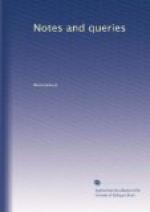This was, however, only a Gadshill robbery,—stealing stolen goods. The following epigram is said to be by Mr. Hole, in a MS. collection made by Spence (penes me), and it appeared first in print in Terrae Filius, from whence Dr. Salter copied it in his Confusion worse Confounded, p. 88:—
“Thy verses are eternal, O my friend!
For he who reads them, reads them to no
end.”
In The Crypt, a periodical published by the late Rev. P. Hall, vol. i. p. 30., I find the following attributed to Coleridge, but I know not on what authority, as it does not appear among his collected poems:—
JOB’S LUCK, BY S. T. COLERIDGE, ESQ.
“Sly Beelzebub took
all occasions
To try Job’s constancy
and patience;
He took his honours, took
his health,
He took his children, took
his wealth,
His camels, horses, asses,
cows,—
Still the sly devil did not take his spouse.
“But heav’n, that
brings out good from evil,
And likes to disappoint the
devil,
Had predetermined to restore
Two-fold of all Job had before,
His children, camels, asses,
cows,—
Short-sighted devil, not to take his spouse.”
This is merely an amplified version of the 199th epigram of the 3d Book of Owen:
“Divitias Jobo, sobolemque, ipsamque
salutem
Abstulit (hoc Domino non prohibens)
Satan.
Omnibus ablatis, misero, tamen una superstes,
Quae magis afflictum redderet,
uxor erat.”
Of this there are several imitations in French, three of which are given in the Epigrammes Choisies d’Owen, par M. de Kerivalant, published by Labouisse at Lyons in 1819.
S.W. SINGER.
Mickleham, 1850.
* * * * *
STRANGERS IN THE HOUSE OF COMMONS.
(Vol. ii., p. 17.)
As far as my observation extends, i.e. the last thirty-one years, no alteration has taken place in the practice of the House of Commons with respect to the admission of strangers. In 1844 the House adopted the usual sessional order regarding strangers, which I transcribe, inserting within brackets the only material words added by Mr. Christie in 1845:—
“That the Serjeant-at-Arms attending this house do, from time to time, take into his custody any stranger or strangers that he shall see or be informed of to be in the house or gallery [appropriated to the members of this house, and also any stranger who, having been admitted into any other part of the house or gallery, shall misconduct himself, or shall not withdraw when strangers are directed to withdraw] while the House or any committee of the whole House is sitting, and that no person so taken into custody be discharged out of custody without the special order of the House.
“That no member of the
House do presume to bring any stranger or
strangers into the house,
or the gallery thereof, while the
House is sitting.”




